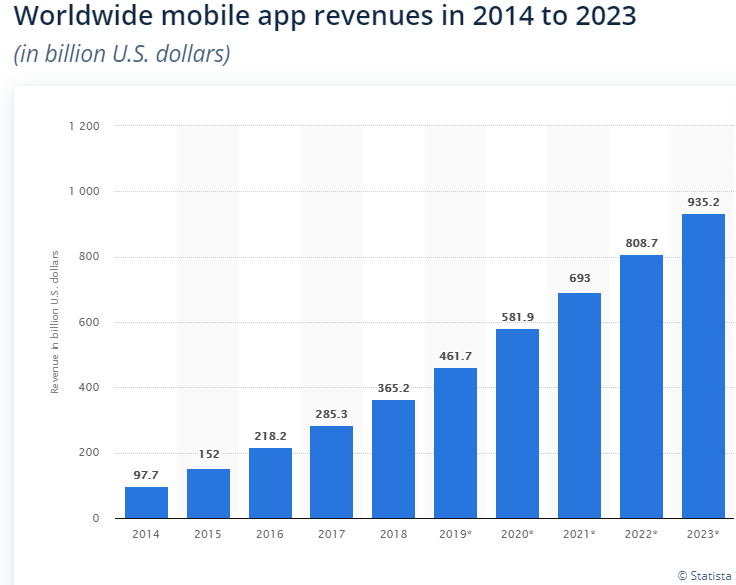From marketing slogan to an actual reality the rise in apps has been endless to a stage that we now see around two million available in the Apple App Store and around a third more available for download on the Google Play Store.
There are over three billion smartphone users and one billion tablet users in the world and research has indicated that around half open one-to ten mobile apps daily: the other half, according to 2018 data from The Manifest, do it more often, with around a quarter 21-50 times daily and two in every 100 more than 100 times.
Mobile apps generated USD365 in revenue in 2018, according to the below chart from Statista, and in 2019 when it was published expected revenue levels to peak higher than $USD935 billion in 2023.

Apps are already playing an important role in the recovery from COVID-19 and the path to travel recovery. Whether it is health service platform monitoring symptoms and the spread of cases, applications providing data and insight on the current spread of infections globally, or technology services facilitating a transition to touch-free processes, the uses are varied.
The desire for a 'seamless' travel experience will have heightened during COVID-19 with travellers searching for an easy-to-use platform, where they can be inspired and informed of where they can travel safely, notes Global Data.
COVID-19 has increased the race to deploy contactless processes, digital health passes and safely store customer data. Therefore, companies should be looking to re-model travel apps to more effectively service and manage the post-pandemic traveller, it says.
The desire for contactless technology is strong among consumers globally as apps that typically use contactless payment allows consumers to purchase at ease. This is influencing how tourism companies target their customers when it comes to booking a holiday, travel or accommodation.
GlobalData's company filing analytics database shows that both mobile payments and online travel were in the top five themes mentioned in tourism company filings in 2020. Destination management organizations (DMOs) are looking to work towards more responsible tourism post-pandemic through better capacity management.
All these areas suggest that travel apps "are the way forward to benefit customer, company and destinations alike," explains Global Data. "Being proactive in developing an end-to-end service that inspires travel confidence, ensures safe travel and overall better management could prove highly lucrative and beneficial for all involved," it adds.
It is now likely that some form of digital passport will be required to travel safely post-pandemic and Johanna Bonhill-Smith, travel and tourism analyst at GlobalData believes there is a lucrative opportunity and a growing need for a travel app that can encompass all elements of a trip into a one stop solution, with omnichannel connectivity that covers everything from simplifying travel requirements to transactions.
"Anything that can help elevate the customer experience and inspire travel confidence should now be a key priority," she explains.
Contactless is key, but seems likely to also extend beyond simple usage to also encompass payment solutions. A higher number of respondents (55%) in GlobalData's survey selected they would only pay for products/services using their cards or mobile phones rather than cash.
The same survey also revealed 60% aim to 'start or continue' making banking transactions online in the 'new normal' following the COVID-19 period. Reasons behind this likely relate to general ease of use alongside health and hygiene. However, there are growing opportunities for app integration in tourism.
"From a company perspective, apps provide opportunity to upsell any additional products and can lead to higher return on investment (ROI). With both mobile payments and online travel ranking highly on GlobalData's filing analytics database (theme mentions in 2020), this shows they are key areas of focus going forward," explains Ms Bonhill-Smith.
Such apps would need to demonstrate the advantages of seamless experiences to the end-user. GlobalData illustrates that an app devised by a DMO for example could promote the experiences within a destination, while managing capacity at certain attractions/locations. Benefits can also be seen here for airports, whereby tourists can be redirected to different areas of the airport due to heavy footfall, ensuring social distancing measures are adhered to, it also acknowledges.
Every year brings new advances in technology and user experience. Apps have already influenced the way we interact with normal life. They are now established in our daily routines and as such will be an obvious platform to facilitate the post-COVID-19 recovery.